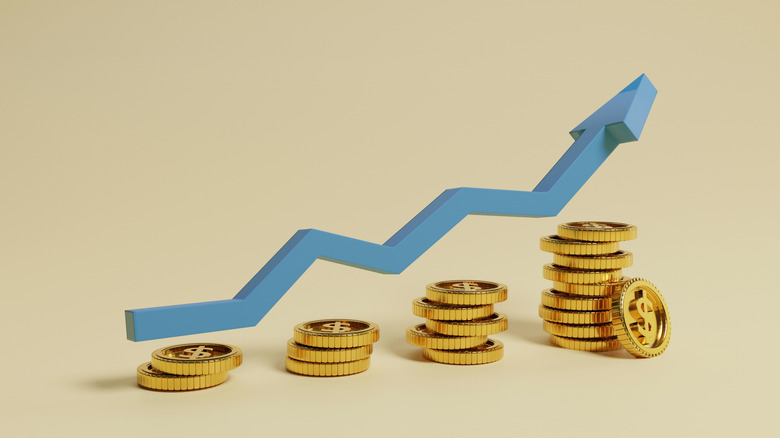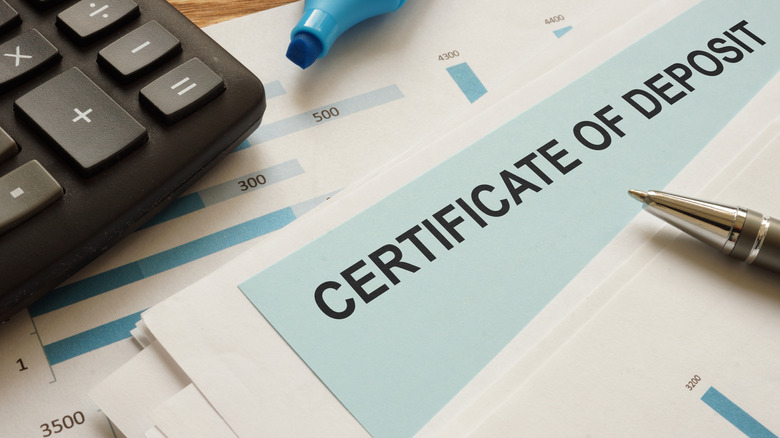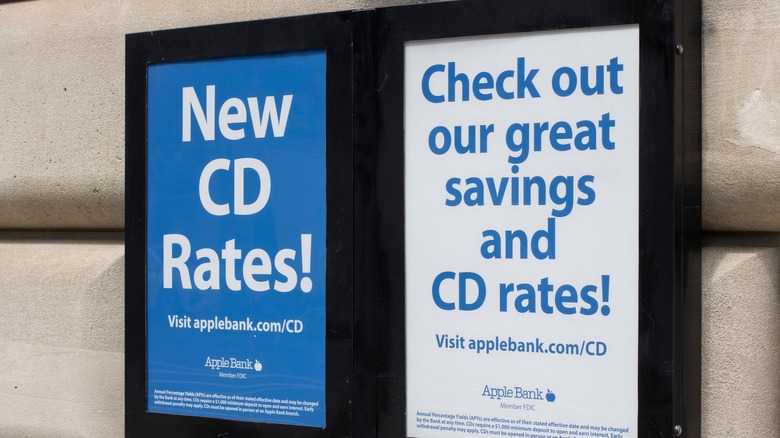Why Experts Are Saying CD Rates Could Rise In 2025
Now that this Federal Reserve committee has finally moved forward on lowering interest rates, you've probably noticed changes in other interest rates across a range of different financial accounts. However, while many might assume that the lowering of the federal rate would subsequently lead to a lowering of rates like, say, credit card APR, you might have instead found that your credit card interest rates went up. Similarly, high yield savings accounts, some of which were offering well over 5% for most of 2024, were quick to begin lowering their monthly APR rates ahead of the Federal Reserve's initial interest rate announcement in September 2024.
All of this is to say that, while interest rates might seem like they are moving in the opposite direction (than what consumers want) across different products, there is one particular financial avenue that could be financially worth it in 2025, certificate of deposits. As a quick refresher, a certificate of deposits or CD is a type of savings account that pays a fixed interest rate for a prescribed period of time ranging from three months to 10 years. Generally speaking the interest rate promised by the bank issuing the CD is higher than what would be offered through something like a high yield savings account, but the person investing the money into this account can't access the funds until after the time period that was agreed upon. While there are pros and cons to this type of account, they could end up being financially worthwhile in 2025.
Will CDs rise in 2025?
Perhaps the most important indicator to watch out for in 2025 is inflation. While the U.S. has succeeded in lowering inflation from its 2022 highs (when it peaked at 9.1% in June of that year), the last several months of 2024 have marked upticks in the inflation rate. As of November 2024, inflation hit 2.7% which is significant compared to the Fed's target of 2%. If inflation continues on an upward trajectory, the Fed might rethink it's decision to continue lowering interest rates, or, depending on how badly inflation might rise, could reverse course altogether and raise interest rates yet again. This situation could be made even worse by the upcoming tariffs (we explained what these are and how consumers pay for them here) being promised by President-elect Donald Trump. However, if interest rates go up, CD rates are also likely to rise.
The bottom line is that just how much CDs rise (or don't) ultimately hinges on the Fed's decision to cut interest rates or not. Aaron Cirksena, CEO of MDRN Capital, explained to CBS News, "If inflation stays high or the economy keeps growing steadily, the Fed might hold or raise rates, which could push CD rates higher." However, he also added, "But, if the economy slows and rates are cut, CD yields could drop." With that in mind, as high yield savings accounts lose much of their incentivizing APR rates, a CD could still offer the opportunity to take advantage of a 5% yield for at least as long as your term applies.
Other things to keep in mind about high yield CDs
It's worth noting that not all CDs are a guarantee. Many CDs actually include a feature known as a call back. Essentially, a bank has the option to call back a CD at any point during the agreed upon term (i.e. before they fully mature). The bank then hands the initial cash deposit and accrued interest back to the consumer, leaving them to have to reinvest – usually at a lower rate of return.
The reason so many investors end up with callable CDs is generally due to the fact they have higher offered rates offered than regular CDs. Kathy Jones, chief fixed-income strategist at Charles Schwab, told the Wall Street Journal, "A lot of investors will look at just the yield. We get people all the time who are like, 'Wait a minute, my CD was called. What happened?'" This is also connected to the fact that most of these CDs are generally brokered, meaning they are sold through a brokerage firm (like Fidelity or Charles Schwab) on behalf of a bank. All of this is to say, the process is very removed from the actual individual customer and ultimately makes it easier for a bank to then decide to callback entire groups of CDs being offered at rates the bank no longer wishes to pay out on. Plus the burden of notification (and the most likely target of a customer's ire) is the brokerage firm the CD was purchased through rather than the bank.


